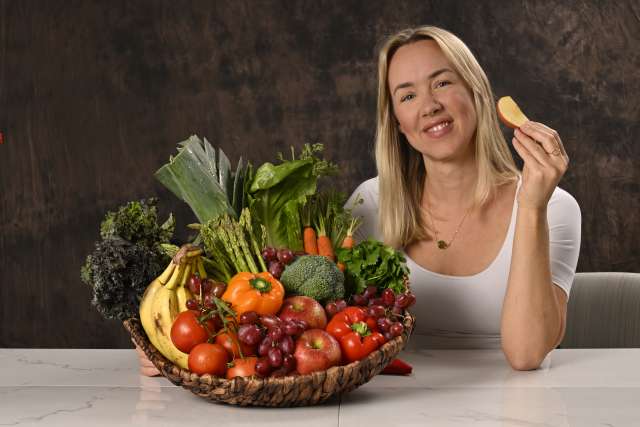The link between obesity and cancer has been clearly demonstrated, but there is a noteworthy lack of awareness among the general population of the correlation between the two, a UCLA nutrition expert said.
“Only about half of Americans are aware that obesity can be a significant contributing factor to cancer," said , a registered dietitian at the . “Obesity” — which is defined as a BMI of 30 or higher — “increases a person’s risk for 12 different types of cancer, including postmenopausal breast cancer, colorectal cancer, pancreatic cancer and advanced prostate cancer.”
With more than , maintaining a healthy weight could prevent approximately 130,000 new cancer cases annually, according to the American Institute for Cancer Research.
Role of nutrition in cancer risk reduction
Nutrition plays a crucial role in reducing the risk of cancer occurrence. Veilleux emphasizes the importance of a diet that is rich in fruits, vegetables, beans, legumes, whole grains, nuts, seeds, lean protein and healthy fats — the so-called Mediterranean diet — while limiting refined foods, added sugars and sugar-sweetened beverages to achieving or maintaining a healthy weight.
Weight loss does not need to be profound to offer notable health benefits. “Even a modest loss of 5% to 10% of someone's total body weight can help reduce many of the risks associated with obesity and cancer,” she explained.
Veilleux highlighted the flexibility of the Mediterranean diet to accommodate different dietary preferences, such as vegan, vegetarian, gluten-free or low-carb diets. By applying Mediterranean principles, individuals can lower their risk of many chronic diseases, including cancer, she said.
Maintaining a healthy weight during treatment
Maintaining a healthy weight can be challenging for patients undergoing treatment for cancer. Veilleux pointed out that treatments may lead to unintentional weight loss, which should be avoided, if possible. She advises shifting the focus from weight loss to maintaining a nutrient-rich diet during treatment.
“Cancer treatment is not a good time to intentionally lose weight, even if you’re overweight,” she said, noting that treatment side effects can also affect appetite and digestion. “Shifting the focus to maintaining good nutrition is a better approach.”
Inflammation is a key factor connecting obesity and cancer. Veilleux distinguished between acute and chronic inflammation, with the latter being more concerning.
“Chronic inflammation tends to be higher among overweight or obese individuals and can potentially cause DNA damage, and DNA damage can influence the development of cancer,” Veilleux explained. “Some other possible connections between cancer and overweight/obesity include the influence on hormone levels and cell and blood vessel growth.”
Misconceptions about diet and cancer risk
“One of the biggest misconceptions is the term ‘cancer prevention,’” Veilleux said. “It’s a term that we often hear, but it suggests that we have the ability to prevent cancer entirely. It gives the false notion that if we lead a healthy lifestyle, maintain a healthy weight and eat the best diet, then we definitely won’t get cancer. Unfortunately, cancer development is complex and often outside of our control.”
Veilleux said she prefers the term “risk reduction.”
“We know there are certain things that we can do to reduce our risk of developing cancer," she said. "By focusing on what we’re able to control, including eating a healthy diet, exercising and trying to get enough sleep — all of which can help achieve and maintain a healthy body weight — we’re doing what we can to reduce our risk of developing a chronic disease such as cancer.”
The Simms/Mann Center takes an integrative approach to oncology, addressing each patient's unique nutrition challenges. Veilleux said patients with cancer may have been dealing with other chronic diseases such as diabetes or high blood pressure prior to their diagnosis, and it is important for dietitians to know that before recommending diet plans.
“We really try to meet people where they are, and to factor in other issues they have been dealing with before cancer and help them prioritize what's important to focus on during their cancer journey,” she said.




